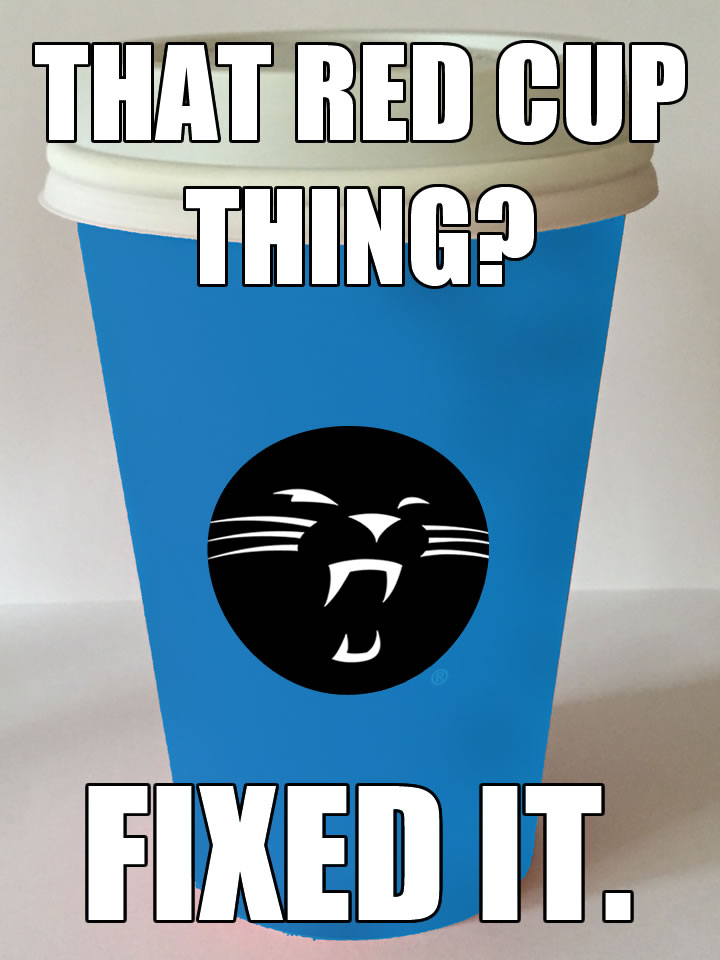How one picture almost got us kicked out of Starbucks

Allow me, if I may, to vent (or, as my sister said, to “Venti” since this is about Starbucks).
There are times when the sheer stupidity of things can almost drive me over the edge, and this past Sunday as my family visited a Starbucks in Salisbury, North Carolina, was one of those times. It started out innocently enough – standing in line, ordering, enjoying the awesome (even if they are overpriced) beverages that our family has come to love.
And then, with one seemingly simple picture, it changed. After taking the picture above of my children with my dad, one of the baristas came over and told me and my sister (she was taking pictures, too) that we couldn’t take pictures in the store.
Caught a little off guard (you should see the blurry picture my sister took when she jumped as she got in trouble!), we put the phones away and went back to the beverages. I lasted about 30 seconds before the absurdity of what I’d been told sunk in, so I went back to the counter for a follow-up.
“So….”
(I drew that first word out just long enough to really get their attention.)
“…just to clarify, you’re telling me that I can’t take pictures of my kids…with my dad…on Father’s Day?”
“Yes. It’s a corporate policy. You can’t take pictures in the store because you might get artwork and stuff in the background.”
“Oh. Well, then is it cool if I just take the pictures facing the front of the store? That way I’ll just get the parking lot and trees in the background.”
“No.”
Since that day, I’ve had the chance to look up the corporate policy and have found – mostly through this post – that the barista could not have been more wrong. For now, just know that as we stood there sipping our beverages and trying to think of any reason why that made sense, we couldn’t come up with one.
In a culture where selfies rule and food and beverage pics run a close second, Starbucks DOESN’T want the free marketing that comes from social media posts?
In a world where imitation is the best form of flattery, Starbucks DOESN’T want people to be so impressed with their environment that they want to post pictures of it?
In a marketplace where families can choose to spend their entertainment dollars anywhere they choose, Starbucks DOESN’T want to make it easy for those families to choose them?
Listen, my world didn’t come to an end over this, and venting about stuff like this is sure to get me a “firstworldproblems” hashtag somewhere in the comments section, but our family left that Starbucks feeling like they made something hard that didn’t have to be. And without trying to spiritualize the whole experience too much, it sort of reminded me of a dilemma that the early church once faced.
As the gospel started spreading across the world, lots of people who were very different from each other started responding to it, and the folks in the mother land of Jerusalem were feeling a little protective of “their” religion. You know, sort of how the barista felt about that artwork that’s partially seen in the picture that almost got us the boot at Starbucks.
In order to keep some kind of order and control, these guys got together to discuss it, and as they were on the verge of setting up all kinds of harsh policies that would be especially painful to the men (you can read about it for yourself in Acts 15), one extremely wise man named James stood up and said this:
It is my judgement, therefore, that we should not make it difficult for the Gentiles who are turning to God.” (Acts 15:19, emphasis added)
I love the way Andy Stanley says it about his church: “We don’t have policies as much as we have conversations.”
Whether it’s corporate like Starbucks or religious like churches, we have a tendency to make sweeping policies that, more times than not, sweep away the very people we’re targeting. We make the people serve the policy instead of allowing conversations to open the door for us to serve the people, and the end result is frustration instead of freedom.
I wish I could say that our church at The Gathering is leading the way in not making it difficult for people who are turning to God, but I’m sure there are plenty of times that we have failed and will fail. We are, however, committed to failing forward, because we value people more than policies, procedures and programs.
And when we don’t make it difficult for people to turn to God, we make it a lot easier for people to find the grace we all need in order to live for God.
– – – – – – – – – –
How about you? What are some ways that churches and/or businesses make things more difficult than they should be? Share your thoughts in the comment section below.








This reminds me of the story of the two traveling monks who reached a river where they met a young woman. Wary of the current, she asked if they could carry her across. One of the monks hesitated, but the other quickly picked her up onto his shoulders, transported her across the water, and put her down on the other bank. She thanked him and departed.
As the monks continued on their way, the one was brooding and preoccupied. Unable to hold his silence, he spoke out. “Brother, our spiritual training teaches us to avoid any contact with women, but you picked that one up on your shoulders and carried her!”
“Brother,” the second monk replied, “I set her down on the other side, while you are still carrying her.”
Is it possible the employee simply made a mistake and by carrying that mistake throughout your visit and out of the store with you, you and your family “made something hard that didn’t have to be?”
Great story, thanks for sharing it. And sure, it’s absolutely possible that she made a mistake. My point wasn’t so much about her as much as it was about policies and rules and how we make things too hard. I’ve got zero issue with a person, and I’m sure I’ll be back at that same Starbucks again.
The story could have many morals. Paul happened to point out the one about the religious folks making rules that God didn’t back… If you pull others from it, great!
So true, Chelsea. It may seem like I’m piling on Starbucks, but I’m not. I’ll be back for more because we love the place. I just saw that connection with the gospel and wanted to share it. Thanks for reading and responding!